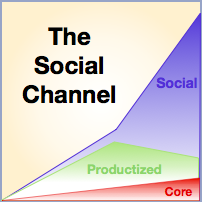![Social Media Upgrade [Social Business Team Building] case1](http://rollyson.net/wp-content/uploads/2013/04/sbtb1.png) [Updated] The Social Media Upgrade applies to most consumer-oriented brands that have been outsourcing much of their social media work to agencies. In 2013, digital marketing and brand executives are thinking about building their internal teams to provide more continuity and scale. [Updated] The Social Media Upgrade applies to most consumer-oriented brands that have been outsourcing much of their social media work to agencies. In 2013, digital marketing and brand executives are thinking about building their internal teams to provide more continuity and scale.
Social Media Upgrade is the first of the five-part social business team building series The series describes team building in the context of various scenarios in which firms build social business capability, step by step, while investing wisely. Social Business Strategy Use Cases outlines and compares all five use cases while Social Business Team Building gives general guidance for how to create social business teams as well as recommendations for what characteristics leaders have, so I recommend reading them, too.
[…]
How to Outperform by Managing the Social Business Risks that Slow Your Competitors
 By understanding the dirty dozen social business risks, you can make fewer mistakes than your rivals and get more done for less money, so this may be one of the most valuable posts you read this year. Having advised executives in adopting disruptive technology since the 1980s, I have learned that hidden assumptions sabotage early adopters’ investments and delay desired business outcomes. Happily, early adopters can significantly diminish social business risks by looking for them and mitigating them with agile development methodologies. CSRA’s client work has shown that using a risk mitigation approach is the most effective way to increase social business return on investment. By understanding the dirty dozen social business risks, you can make fewer mistakes than your rivals and get more done for less money, so this may be one of the most valuable posts you read this year. Having advised executives in adopting disruptive technology since the 1980s, I have learned that hidden assumptions sabotage early adopters’ investments and delay desired business outcomes. Happily, early adopters can significantly diminish social business risks by looking for them and mitigating them with agile development methodologies. CSRA’s client work has shown that using a risk mitigation approach is the most effective way to increase social business return on investment.
[…]
 Bill Snyder at Infoworld posted some amazing statistics that support the end of social media as we know it, which I predicted in 2009. Marketing and public relations have been losing influence for years because they are impersonal, and people prefer personalized interactions (deep dive here), so marketers and their vendors are grasping at straws. In this context, “social media” has generally been practiced as a shallow promotional activity, and my premise in predicting its demise is that the true potential of social technologies is creating and maintaining relationships, which are based on personalized attention and caring. Bill Snyder at Infoworld posted some amazing statistics that support the end of social media as we know it, which I predicted in 2009. Marketing and public relations have been losing influence for years because they are impersonal, and people prefer personalized interactions (deep dive here), so marketers and their vendors are grasping at straws. In this context, “social media” has generally been practiced as a shallow promotional activity, and my premise in predicting its demise is that the true potential of social technologies is creating and maintaining relationships, which are based on personalized attention and caring.
[…]
Social Channel Two: Understanding the Social Channel of Value by Examining Its Precedents
 Meet the Social Channel of Value, the new arena where brands compete for user (customer, client) attention and loyalty. Product features are losing their ability to differentiate because they are copied so easily. Moreover, the Social Channel of Value will transform human decision-making, organizations and institutions because it digitizes sociality, a core human trait, and its power will dwarf the power of the product and the brand. CEOs, CMOs and CPOs have a very rare social business opportunity to harness the Social Channel ahead of competitors and remake their markets. These are strong statements, but bear with me and I think you’ll appreciate why I’ve made them. Meet the Social Channel of Value, the new arena where brands compete for user (customer, client) attention and loyalty. Product features are losing their ability to differentiate because they are copied so easily. Moreover, the Social Channel of Value will transform human decision-making, organizations and institutions because it digitizes sociality, a core human trait, and its power will dwarf the power of the product and the brand. CEOs, CMOs and CPOs have a very rare social business opportunity to harness the Social Channel ahead of competitors and remake their markets. These are strong statements, but bear with me and I think you’ll appreciate why I’ve made them.
The Social Channel is the Knowledge Economy‘s analog to the Industrial Economy’s assembly line, which led to today’s brands and mass-produced products. Where the assembly line made fabrication ten times more efficient, digital social technologies will boost human communication and sociality by an order of magnitude. The “Social Channel of Value” shows how product and service features will […]
Social Channel One: Building Post-Product Relationships with Customers is how to Build Brands
 Pioneering brands are building post-product customer relationships in the social channel because they realize that product features are copied easily and serve as weak differentiators, which leads to pervasive commoditization. Moreover, people’s preferences for individualized information dealt mass media a lethal blow, and products firms will have a similar fate. Here’s why products will become extinct and how to guide your brand in building post-product customer relationships and profits. Pioneering brands are building post-product customer relationships in the social channel because they realize that product features are copied easily and serve as weak differentiators, which leads to pervasive commoditization. Moreover, people’s preferences for individualized information dealt mass media a lethal blow, and products firms will have a similar fate. Here’s why products will become extinct and how to guide your brand in building post-product customer relationships and profits.
I have predicted for years that mass customization would be the fate of “products,” and social business is bearing this out in spades, so here I’ll delve into how impersonal “products” will be rejected by customers in 5-15 years. More important, CMOs and brand stewards who appreciate this transformation will enjoy unusual advantage, and smart ones will prepare for it now. Brands that don’t get it will simply perish, and no one will even notice except their producers and vendors. Just think about the local papers and TV stations you have known.
This is Part One […]
Upgrading the Expert Role for the Knowledge Economy shows how knowledge workers can no longer seek refuge in their core expertise, and how to branch out.

“Experts” are regarded as the foremost authorities in their fields, the glib guru versions notwithstanding. An oft quoted maxim shows why: according to Malcolm Gladwell, for one, it takes 10,000 hours [of study, work] for most people to become expert in something.* On a related front, Naveen Jain posits that experts will be less likely to solve today’s toughest problems because their expertise has become a box around them. All those degrees or promotions within the organization have focused their minds but also closed out creativity. While commenting on his post, I realized that redefining the expert would be necessary in the Knowledge Economy, so here I’ll offer some strategies and tactics for how to practice being an “expert” in the 21st century.
Notably, we can take lessons from experts and apply them to specialists, which are arguably less far along on the same vector—and more common.
[…]
 I have written often about various facets of social business disruption, which usually causes organizations angst because they have to learn to change how they do things. On a happier note, nonprofits and NGOs, long accustomed to being (relatively) disadvantaged do-gooders grateful for commercial bodies’ largesse, actually have more of an advantage in social business than commercial firms (“brands”). I have written often about various facets of social business disruption, which usually causes organizations angst because they have to learn to change how they do things. On a happier note, nonprofits and NGOs, long accustomed to being (relatively) disadvantaged do-gooders grateful for commercial bodies’ largesse, actually have more of an advantage in social business than commercial firms (“brands”).
In this context, government usually lies between nonprofits and brands because it’s not commercially focused (advantage), but it rarely considers individuals in meaningful ways (disadvantage). Here I’ll lay out the rationale for these claims before giving some practical pointers for unlocking social business potential by understanding the social good of your business. Brands and governments, you can learn from this, too.
[…]
CSRA’s experiential social media services and social business help CEOs, CDOs, CMOs, Chief Customer Officers and CIOs to use disruptions like customer empowerment, social media, mobile, big data and Web 3.0 to seize unusual advantage. All our work leverages the Social Network Roadmap(SM). Its rigorous analytical and ethnographic research methods enable us to understand user behavior and organizational realities, so our recommendations are realistic and effective at producing business results. Our clients outperform because they avoid the mistakes their competitors make.
Due to the strategic nature of our work, we usually serve as facilitators and partner with our client’s management. Engagements address all parts of the social business life cycle. To appreciate the relationship between experiential social media and social business, read this short summary.
In 2015, CSRA released the Social Channel App (Beta), an interactive guide to experiential social media and social business for executives. The App features two versions of the Social Network Roadmap and enables users to get started with a DIY approach. The beta edition also shipped with two business applications, Customer Experience and Employee Engagement, as well as an experiential Guide to Social Media Platforms.
CSRA uses the IP/tools here to create specific engagements (for […]
B2B Customers Getting Social Fast: How Marketing and Sales Can Evolve explains how clients/customers are smarter and want a new kind of relationship | The new economics of business reputation
 While preparing to launch Social Business Services for B2B Sales in January 2012, I have been engaged in its Ecosystem Audit. I have plumbed online conversations about B2B Sales and Marketing adoption of social business (erstwhile social media). I have been struck by a recurring realization: a large part of Marketing and Sales as we know them is significantly out of alignment with B2B customers. Social business is permeating customer networks throughout the economy and changing customer behavior and expectations. This has created a rare opportunity for B2B marketing and sales people who understand and respond ahead of the market. If I’m right, this could be one of the most important posts you read this year. While preparing to launch Social Business Services for B2B Sales in January 2012, I have been engaged in its Ecosystem Audit. I have plumbed online conversations about B2B Sales and Marketing adoption of social business (erstwhile social media). I have been struck by a recurring realization: a large part of Marketing and Sales as we know them is significantly out of alignment with B2B customers. Social business is permeating customer networks throughout the economy and changing customer behavior and expectations. This has created a rare opportunity for B2B marketing and sales people who understand and respond ahead of the market. If I’m right, this could be one of the most important posts you read this year.
Two quick examples of misalignment: one of Marketing’s underlying assumptions is that it is not economically feasible to have large-scale one-on-one customer conversations, so marketing must […]
 As a speaker at the CIO Forum & Executive IT Summit this past week, I spent two days in focused conversations with enterprise CIOs. The summit is co-sponsored by SIM, TEN and ITEEX and is a relatively intimate setting as most attendees are CIOs, and no press is allowed. We spoke about what was top of mind for CIOs and their experiences with social business. It served as an excellent “current state of the CIO,” and I have some surprising takeaways to share. I’ll also offer a surprising prediction and social business guidance to CIOs. As a speaker at the CIO Forum & Executive IT Summit this past week, I spent two days in focused conversations with enterprise CIOs. The summit is co-sponsored by SIM, TEN and ITEEX and is a relatively intimate setting as most attendees are CIOs, and no press is allowed. We spoke about what was top of mind for CIOs and their experiences with social business. It served as an excellent “current state of the CIO,” and I have some surprising takeaways to share. I’ll also offer a surprising prediction and social business guidance to CIOs.
Having advised CEOs, CIOs, COOs and CMOs on adopting disruptive technology at various stages of my career, I have a broad perspective of the enterprise and executive roles. From the mid 1990s through 2006, I focused on enterprise software and corporate strategy. In 2006, I launched CSRA to advise enterprises on social business strategy, and I’ve been working with CMOs, which has been personally rewarding as I have also led marketing several times in my career. For context, here are a few things that most executives don’t yet […]
|
|
![Social Media Upgrade [Social Business Team Building] case1](http://rollyson.net/wp-content/uploads/2013/04/sbtb1.png) [Updated] The Social Media Upgrade applies to most consumer-oriented brands that have been outsourcing much of their social media work to agencies. In 2013, digital marketing and brand executives are thinking about building their internal teams to provide more continuity and scale.
[Updated] The Social Media Upgrade applies to most consumer-oriented brands that have been outsourcing much of their social media work to agencies. In 2013, digital marketing and brand executives are thinking about building their internal teams to provide more continuity and scale.
 By understanding the dirty dozen social business risks, you can make fewer mistakes than your rivals and get more done for less money, so this may be one of the most valuable posts you read this year. Having advised executives in adopting disruptive technology since the 1980s, I have learned that hidden assumptions sabotage early adopters’ investments and delay desired business outcomes. Happily, early adopters can significantly diminish social business risks by looking for them and mitigating them with agile development methodologies. CSRA’s client work has shown that using a risk mitigation approach is the most effective way to increase social business return on investment.
By understanding the dirty dozen social business risks, you can make fewer mistakes than your rivals and get more done for less money, so this may be one of the most valuable posts you read this year. Having advised executives in adopting disruptive technology since the 1980s, I have learned that hidden assumptions sabotage early adopters’ investments and delay desired business outcomes. Happily, early adopters can significantly diminish social business risks by looking for them and mitigating them with agile development methodologies. CSRA’s client work has shown that using a risk mitigation approach is the most effective way to increase social business return on investment. Bill Snyder at Infoworld posted some amazing statistics that support the end of social media as we know it, which I predicted in 2009. Marketing and public relations have been losing influence for years because they are impersonal, and people prefer personalized interactions (deep dive here), so marketers and their vendors are grasping at straws. In this context, “social media” has generally been practiced as a shallow promotional activity, and my premise in predicting its demise is that the true potential of social technologies is creating and maintaining relationships, which are based on personalized attention and caring.
Bill Snyder at Infoworld posted some amazing statistics that support the end of social media as we know it, which I predicted in 2009. Marketing and public relations have been losing influence for years because they are impersonal, and people prefer personalized interactions (deep dive here), so marketers and their vendors are grasping at straws. In this context, “social media” has generally been practiced as a shallow promotional activity, and my premise in predicting its demise is that the true potential of social technologies is creating and maintaining relationships, which are based on personalized attention and caring.  Meet the Social Channel of Value, the new arena where brands compete for user (customer, client) attention and loyalty. Product features are losing their ability to differentiate because they are copied so easily. Moreover, the Social Channel of Value will transform human decision-making, organizations and institutions because it digitizes sociality, a core human trait, and its power will dwarf the power of the product and the brand. CEOs, CMOs and CPOs have a very rare social business opportunity to harness the Social Channel ahead of competitors and remake their markets. These are strong statements, but bear with me and I think you’ll appreciate why I’ve made them.
Meet the Social Channel of Value, the new arena where brands compete for user (customer, client) attention and loyalty. Product features are losing their ability to differentiate because they are copied so easily. Moreover, the Social Channel of Value will transform human decision-making, organizations and institutions because it digitizes sociality, a core human trait, and its power will dwarf the power of the product and the brand. CEOs, CMOs and CPOs have a very rare social business opportunity to harness the Social Channel ahead of competitors and remake their markets. These are strong statements, but bear with me and I think you’ll appreciate why I’ve made them.
 I have written often about various facets of social business disruption, which usually causes organizations angst because they have to learn to change how they do things. On a happier note, nonprofits and NGOs, long accustomed to being (relatively) disadvantaged do-gooders grateful for commercial bodies’ largesse, actually have more of an advantage in social business than commercial firms (“brands”).
I have written often about various facets of social business disruption, which usually causes organizations angst because they have to learn to change how they do things. On a happier note, nonprofits and NGOs, long accustomed to being (relatively) disadvantaged do-gooders grateful for commercial bodies’ largesse, actually have more of an advantage in social business than commercial firms (“brands”). While preparing to launch Social Business Services for B2B Sales in January 2012, I have been engaged in its Ecosystem Audit. I have plumbed online conversations about B2B Sales and Marketing adoption of social business (erstwhile social media). I have been struck by a recurring realization: a large part of Marketing and Sales as we know them is significantly out of alignment with B2B customers. Social business is permeating customer networks throughout the economy and changing customer behavior and expectations. This has created a rare opportunity for B2B marketing and sales people who understand and respond ahead of the market. If I’m right, this could be one of the most important posts you read this year.
While preparing to launch Social Business Services for B2B Sales in January 2012, I have been engaged in its Ecosystem Audit. I have plumbed online conversations about B2B Sales and Marketing adoption of social business (erstwhile social media). I have been struck by a recurring realization: a large part of Marketing and Sales as we know them is significantly out of alignment with B2B customers. Social business is permeating customer networks throughout the economy and changing customer behavior and expectations. This has created a rare opportunity for B2B marketing and sales people who understand and respond ahead of the market. If I’m right, this could be one of the most important posts you read this year. As a speaker at the CIO Forum & Executive IT Summit this past week, I spent two days in focused conversations with enterprise CIOs. The summit is co-sponsored by SIM, TEN and ITEEX and is a relatively intimate setting as most attendees are CIOs, and no press is allowed. We spoke about what was top of mind for CIOs and their experiences with social business. It served as an excellent “current state of the CIO,” and I have some surprising takeaways to share. I’ll also offer a surprising prediction and social business guidance to CIOs.
As a speaker at the CIO Forum & Executive IT Summit this past week, I spent two days in focused conversations with enterprise CIOs. The summit is co-sponsored by SIM, TEN and ITEEX and is a relatively intimate setting as most attendees are CIOs, and no press is allowed. We spoke about what was top of mind for CIOs and their experiences with social business. It served as an excellent “current state of the CIO,” and I have some surprising takeaways to share. I’ll also offer a surprising prediction and social business guidance to CIOs.